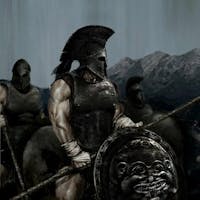Debunking the Myth of the Serbian and Greek Origins of Skanderbeg
 Arberian 10/05/2024
Arberian 10/05/2024 
Many Serbs, along with others, assert that Skanderbeg had Serbian origins, citing the Slavic name of his mother, Vojsava Tribalda. This claim is further supported by the belief that "Tribalda" may refer to the Triballi, an ancient tribe often associated with Serbs during the Middle Ages.
However, Vojsava’s Slavic name does not necessarily indicate that she was Serbian. It is well-documented that Albanians, lacking their own Orthodox Church, were compelled to adopt Slavic names and surnames under the rule of Emperor Dušan. During his reign, Catholic Albanians faced severe religious persecution and were forced to convert to Orthodoxy, with these imposed names often being passed down through generations.
In this book, by Alexandru Madgearu a Romanian author, notes that Serbian state policy required Catholic Albanians to convert to Orthodoxy and adopt Serbianized names. This context explains why Vojsava bore a Slavic name. Moreover, there are no primary sources that identify her as a member of the Branković family.



About her surname being similiar to the "Triballi," Serbs weren't the only people who were called Tribals but also the Albanians.
According to a Greek author from the 1700s, in his Book::
-
He calls the Dalmatians Albanians
-
He calls the Triballis Albanians
-
He places the Albanians together with the Illyrians
Above all Albanians are clearly mentioned in front of komnena's book, which is assumed to be the first document that mentions them.


As we can see, the term "Tribal" was likely just a regional designation. Similarly, Bosnians and Croats were referred to as Illyrians due to their being under the jurisdiction of Illyricum. It is well established that Skanderbeg's mother was from the Polog region, located in what is now North Macedonia, which was under the Serbian rule of Emperor Dušan at the time.
According to Strabo, the Triballi were a Thracian people, and we know very well that the Serbs are Slavs who migrated in the 6th century AD in the Balkans, and have nothing to do with them.

Now that I’ve debunked the theory of Skanderbeg’s so-called "Serbian origins," let's take a look what Skanderbeg himself said.
This is the letter of the Prince of Taranto directed to him:

And this is how Skanderbeg replied:

What we know from that now is that:
-
Skanderbeg clearly asserted his Albanian heritage, stating that the Albanians were descendants of the ancient Epirotes and Pyrrhus himself.
-
The Prince of Taranto asserted that the Albanians were descended from the ancient Macedonians.
According to Andrea Angelo Comneno, an Italian author of 1555, in Page 15 of his book, stated that Voisava belonged to the Noble Albanian family of the Muzaka.

Also Skanderbeg himself, when Brankovic stopped him to go and assist Hunyadi against the Ottomans, went and burned lot of Serbian villages until Belgrade.

Here's a old text taken from a document talking about it:


And here's some Books:


Book 2:


As we discussed about Voisava, the same goes for Skanderbeg's father, Gjon Kastrioti, called by the Serbs as "Jovan," is just another of their fairy tailes.
Also the Grandfather of Skanderbeg, Serbs might say he was called Branilo and belonged to the Brankovic, however, we can see at the family of Skanderbeg, no "Branilo" is mentioned.

And also Marinus Barletius mentioned that Skanderbeg was the Prince of Epirus, Macedonia and Illyria


Now that i've debunked his "Serbian Origins," let's take a look at these Old Greek documents which stated that Skanderbeg was Albanian:







And what Stephanus of Byzantium said about the Triballians:

Thanks for reading.
A reminder that Skanderbeg's haplogroup from Eupedia are fake news, we will have his haplogroups by Rrenjet on October 2024.

About Arberian
An Albanian, interested in history and genetics.



